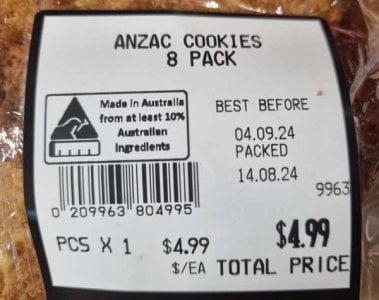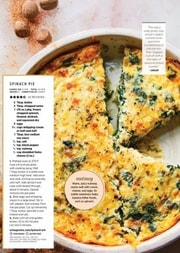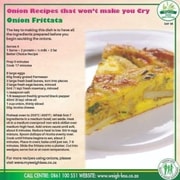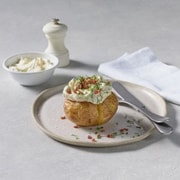'Straight to jail': Shoppers share confusion over IGA's ANZAC Biscuits
By
Danielle F.
- Replies 10
When it comes to Australian traditions, few things are held as sacred as the ANZAC biscuit.
This humble treat is more than a snack, but a symbol of national pride and remembrance.
A local supermarket stocking ANZAC biscuits—with a label that could potentially make them illegal—caused quite a stir online.
The controversy began when an observant shopper spotted a contentious label on an eight-pack of ANZAC biscuits.
The packaging referred to the iconic Australian treat as 'cookies', a term breaching Australian law.
According to the Protection of Word 'ANZAC' Act 1920, ANZAC biscuits 'must not substantially deviate from the generally accepted recipe and shape, and must be referred to as ANZAC Biscuits or ANZAC Slice, not ANZAC cookies'.
The law also imposed steep fines and even up to 12 months in jail for non-compliance.
Social media users quickly reacted to the post.
'ANZAC f****** what, now?' one shopper reacted.
'Straight to jail', another shopper said.
The label also had another point of contention: the biscuits were made with 'at least 10 per cent Australian ingredients'.
'What should be illegal is ANZAC biscuits only containing 10 per cent of Australian ingredients,' one remarked.
However, not everyone was up in arms over the label.
'S***** thing to even notice, let alone get upset over,' a social media user wrote.
'Because that's the most important thing we as a nation have to worry about', another wrote.
This divide in opinion reflected a broader conversation about the importance of tradition versus the tendency to get caught up in minor details.
The debate over the correct naming of ANZAC biscuits isn't new.
Recently, shoppers falsely accused Woolworths of not selling ANZAC biscuits for the year.
However, the supermarket giant clarified that it continues to support the RSL's ANZAC Appeal by selling badges and wristbands and has raised substantial funds over the past decade.
The significance of ANZAC biscuits extends far beyond their ingredients.
Sent initially to Australian troops during World War One, these biscuits supplemented the soldiers' basic rations.
They were also valued for their nutritional content and long shelf life.
Today, they serve as a tangible connection to Australia's wartime history and a way to honour the sacrifices made by the ANZACs at Gallipoli and France.
As we reflect on this controversy, it's essential to remember the reasons why ANZAC biscuits hold such a special place in our hearts and pantries.
So, next time you're at your local IGA or any supermarket, check if their ANZAC biscuits are not just delicious but also respectful of the legacy they carry.
For those who want to make it at home, @Bullwinkle shared a recipe for the ANZAC biscuits here.

What are your thoughts on this labelling issue? We'd love to hear your opinions in the comments section below!
This humble treat is more than a snack, but a symbol of national pride and remembrance.
A local supermarket stocking ANZAC biscuits—with a label that could potentially make them illegal—caused quite a stir online.
The controversy began when an observant shopper spotted a contentious label on an eight-pack of ANZAC biscuits.
The packaging referred to the iconic Australian treat as 'cookies', a term breaching Australian law.
According to the Protection of Word 'ANZAC' Act 1920, ANZAC biscuits 'must not substantially deviate from the generally accepted recipe and shape, and must be referred to as ANZAC Biscuits or ANZAC Slice, not ANZAC cookies'.
The law also imposed steep fines and even up to 12 months in jail for non-compliance.
Social media users quickly reacted to the post.
'ANZAC f****** what, now?' one shopper reacted.
'Straight to jail', another shopper said.
The label also had another point of contention: the biscuits were made with 'at least 10 per cent Australian ingredients'.
'What should be illegal is ANZAC biscuits only containing 10 per cent of Australian ingredients,' one remarked.
However, not everyone was up in arms over the label.
'S***** thing to even notice, let alone get upset over,' a social media user wrote.
'Because that's the most important thing we as a nation have to worry about', another wrote.
This divide in opinion reflected a broader conversation about the importance of tradition versus the tendency to get caught up in minor details.
The debate over the correct naming of ANZAC biscuits isn't new.
Recently, shoppers falsely accused Woolworths of not selling ANZAC biscuits for the year.
However, the supermarket giant clarified that it continues to support the RSL's ANZAC Appeal by selling badges and wristbands and has raised substantial funds over the past decade.
The significance of ANZAC biscuits extends far beyond their ingredients.
Sent initially to Australian troops during World War One, these biscuits supplemented the soldiers' basic rations.
They were also valued for their nutritional content and long shelf life.
Today, they serve as a tangible connection to Australia's wartime history and a way to honour the sacrifices made by the ANZACs at Gallipoli and France.
As we reflect on this controversy, it's essential to remember the reasons why ANZAC biscuits hold such a special place in our hearts and pantries.
So, next time you're at your local IGA or any supermarket, check if their ANZAC biscuits are not just delicious but also respectful of the legacy they carry.
For those who want to make it at home, @Bullwinkle shared a recipe for the ANZAC biscuits here.
Key Takeaways
- An IGA supermarket stocked ANZAC biscuits labelled as 'cookies', breaching the Protection of Word 'ANZAC' Act 1920.
- Under government guidelines, ANZAC biscuits must not be referred to as 'cookies' to comply with regulations.
- Some social media users shared their disapproval of the label, citing both legal concerns and a 'lack' of Australian ingredients.
- In a related incident, Woolworths was wrongfully accused of not selling ANZAC biscuits, yet the supermarket continues to support the RSL's ANZAC Appeal.








